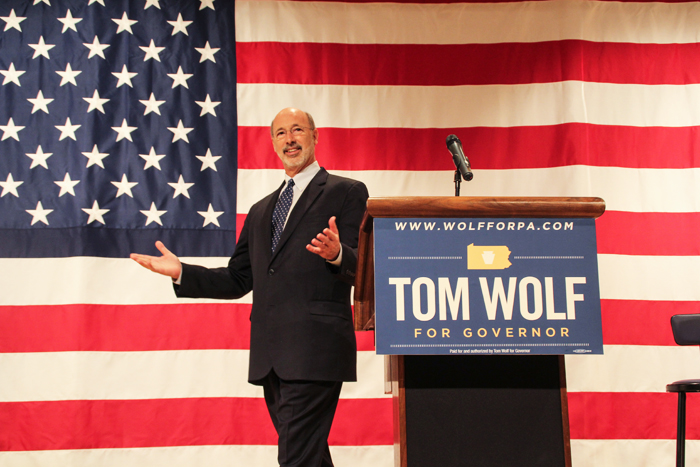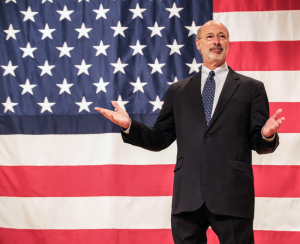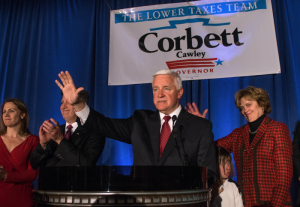

By Julian Routh | News Editor
When newly elected Pennsylvania Governor Tom Wolf takes office in January, he will be tasked with initiating a number of plans he outlined in his campaign, some of which will impact higher education and post-college employment.
On the campaign trail, Wolf, 65, of York County, pledged to make education his top priority if elected. In an effort to make college more accessible and more affordable, he plans to create a Deserving Scholars program that would help high achieving, low income students apply to school.
Through the program, low income students who have scored in the top 20 percent on the SATs or who have earned a 3.75 GPA will receive six waivers for applications to state-owned schools.
Wolf has also outlined plans to give veterans better access to higher education through tuition grants and support centers.
The governor-elect reinforced his commitment to post-secondary education in his victory speech Tuesday evening at Utz Arena in York.
“We have to invest in [education]. We have to work together to make sure we deliver on that promise,” Wolf said. “We’ve also got to make sure that we fund our education system fairly … that we raise [funds] fairly. That we’re not burdening, say, property tax payers.”
Pennsylvania ranks 47th among states in funding for public higher education per $1,000 of personal income, according to a report from the Keystone Research Center. The report also found that the state has the third-highest tuition and fees at its public four-year colleges.

Another issue facing the incoming governor is job growth. Pennsylvania sits dead last among states in the U.S. for job growth since January 2011, the Keystone Research Center reported. The state lost 9,600 jobs in September alone.
However, with the emergence of natural gas drilling in Pennsylvania, job growth in the Marcellus Shale industry has risen. According to the Pennsylvania Department of Labor, new hires in core Marcellus Shale industries increased 35 percent from the second quarter of 2010 to the second quarter of 2013.
One of Wolf’s main campaign proposals was the institution of a five percent severance tax on shale, which would pump money into holes in the state budget, including education.
Antony Davies, associate professor of economics at Duquesne, said the severance tax will benefit the government and sectors like public education, but negatively impact frackers and land owners.
“This means less income for people who sell mineral rights, less income for people who work for the shale industry, less income for people who invest their retirement money in shale companies and high energy prices for people everywhere,” Davies said.
Wolf ousted Republican incumbent Tom Corbett on Election Day Tuesday by a margin political experts expected. With more than 99 percent of districts counted, Wolf took approximately 55 percent of the vote. Preliminary polls by Harper Polling had Wolf winning by 10 percent.
Corbett, who served one term, is the first governor to lose re-election in the state since 1974, when governors were first allowed to run a second time under the Pennsylvania Constitution.
In his concession speech Tuesday night, Corbett said he delivered on the promises he made when he took office in 2010, including fiscal discipline, limited government and free enterprise.
“I am extremely proud of what we together were able to accomplish,” Corbett told his supporters at the Omni William Penn Hotel Downtown. “I am a forever changed person.”
In an official statement, Pittsburgh Mayor Bill Peduto, a Democrat, congratulated Wolf on his victory, saying he looks forward to working with the new governor from “one agenda.”
“Western Pennsylvania officials jumped on the Wolf train early, and we got behind Tom because we not only believed that he was a candidate who could win, but he was the one who most likely aligned with the kind of things we want to do out here,” the statement said.
Corbett’s defeat was one of few Election Day disappointments for the Republicans. The GOP gained control of the U.S. Senate, won more than half of the 36 governors’ races and seized their biggest majority in the House of Representatives in more than half a century.
For Wolf, working along partisan lines might be difficult, but for now, he is optimistic.
“Here’s my message: Let’s make this the time. Let’s make this the place, Pennsylvania,” Wolf said. “Let’s be the people to create this bright future we deserve.”
Wolf will be sworn in as governor in January.



